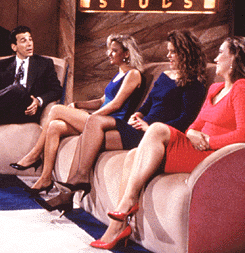GOLDSEA | ASIAMS.NET | ASIAN AMERICAN PERSONALITIES
SECOND ACT FOR A BADBOY
PAGE 3 OF 5
| "She's the one who convinced me not to become an academecian. She just said, 'Have some fun; try something different.'" |
Q: If you were still an executive at Fox TV, what kind of
counter-programming would you be pushing right now?
A: I don't know. It really was a full-time job to eat and breathe television
broadcasting. My mind hasn't thought in that direction since I left Fox. I
think the news is conceptually due for an overhaul. I think there's an
opportunity for someone to innovate in that area, only because the
competition is very similar. When that happens, it's just an open invitation
for fun and rearranging the deck.
Q: What do you think of the vast television potential of Asia, the world's
largest untapped market?
A: It's a totally engaging marketplace because of its challenge and its
population and different cultures. I think Rupert Murdoch's acquisition of a
controlling interest in Star TV (a Hong Kong-based satellite TV network that
spans 38 countries from Asia to the Middle East) is without question the
most exciting acqusition of the decade. It's just a stunning development. His
forays into electronic media have been really widespread and they really
make a lot of sense with this acquisition. I would say they were slightly
disparate before, but now he really has made a breathtaking move ahead of
other media companies. The most interesting thing will be Rupert's efforts
to have programming and news and information that covers the globe. His
ability to speed up the transfer of information is really going to be
unlimited. And I think that's a very good thing because it's just pure
information.
Q: It sounds like an awesome challenge.
A: That's why it's fun. It's big, and there are a lot of different populations to
deal with. That's the strength and the weakness of the whole thing. To
what extent one marries local presentation to pan-cultural presentation is
the $64,000 question. That concept is just so much fun to play with. Who
knows what it will be in 10 years, but Murdoch is very smart. He'll figure
out the right formulas.
Q: One word that you keep mentioning is "fun". Would you ever do anything
that wasn't fun, even if you could make tons of money?
A: Never. I would stop working if it ceased to be fun. There is a point at
which a particular task or deal isn't fun. If that's the case I'll drop it very
quickly.
Q: If Murdoch invited you to work for him at Star TV, would you be
interested?
A: If I were single and 10 years younger I would do that in a heartbeat. But
that's the kind of if that's unrealistic. I happen to live where I live and
I like the areas that I'm playing in, so the answer is inappropriate for me. If
I were straight out of college, I would go there in a second.

Studs is one of the Fox TV hits introduced during Chao's tenure as its president.
Q: How are you enjoying your transition into film and home shopping
television?
A: I love it. They're two arenas that I feel comfortable taking on. Strictly
speaking, I haven't had experience in either film production or home
shopping, but I feel comfortable with them conceptually. As long as its an
interesting and fun challenge to me, I have a shot.
Q: If you could look 10 years into the future, what do you think
TV will look like?
A: I think the programming will be the same.
Q: How about interactive television and its impact?
A: As far as interactive television, I'm not technophobic but I'm not a
techno-lover either. And I don't think the interactivity will change the
creativity of the programming. I think the interactivity is interesting in
transactional commerce, but the interactivity has to be paid for. In the
traditional sense of sitcoms, dramas and reality shows, I don't think
interactivity will have an impact. It's an evolution of retailing.
Q: Tell me a little about your upbringing.
A: I grew up in Michigan and New Hampshire. My dad was an MIT physicist
and my mother is an American literature professor at Bennington College in
Vermont. So I have an academic background. Too many PhDs in this
family, actually.
Q: Were you a good student?
A: Well, I worked hard. Actually, the hardest work that I did was in prep
school. Everything after that was not quite so consuming. We used to have
six days a week of classes, and we'd regularly stay up all night to study.
After that, it was kind of simple.
Q: Were you encouraged to pursue academia?
A: Actually, I was discouraged. After I graduated from Harvard I had a
fellowship [in Greek and Latin studies] to go to Yale. My mother pretty much
convinced me to take a few years off. She's the one who convinced me not
to become an academecian. She just said, "Have some fun; try something
different."
PAGE 4
CONTACT US
|
ADVERTISING INFO
© 1996-2013 Asian Media Group Inc
No part of the contents of this site may be reproduced without prior written permission.
